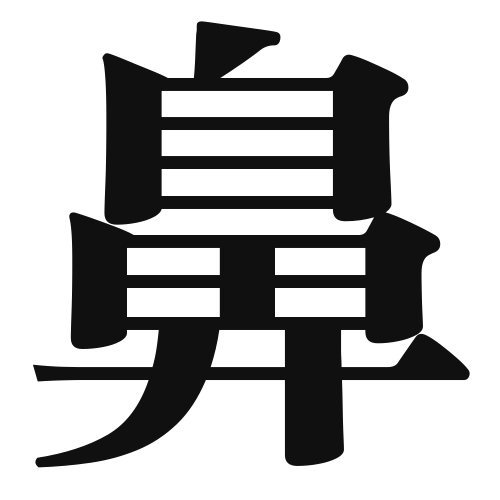1. Overview of Meaning
The kanji “鼻” (hana) means “nose” in English. It refers to the part of the face that is used for breathing and smelling.
2. Formation and Radical
The kanji “鼻” is a phono-semantic compound (形声文字), which means it combines both a phonetic and a semantic component. The left part, “⺧” (the radical for “nose”), indicates the meaning, while the right part “鼻” suggests the pronunciation.
The radical for “鼻” is “⺧” (the nose radical), which is often associated with words related to the nose or breathing.
3. Examples of Usage
Common words and phrases that include “鼻” are:
- 鼻水 (はなみず, hanamizu) – “nasal mucus” or “snot”
- 鼻血 (はなぢ, hanaji) – “nosebleed”
- 鼻が高い (はながたかい, hanagatakai) – “to be proud” (literally “to have a high nose”)
Example sentence in daily conversation:
「風邪をひいたので、鼻が詰まっています。」
(I have a cold, so my nose is stuffed up.)
4. Synonyms and Antonyms
Similar kanji with related meanings include:
- 口 (くち, kuchi) – “mouth” (refers to a different facial feature)
- 目 (め, me) – “eye” (another facial feature)
Antonyms include:
- 耳 (みみ, mimi) – “ear” (refers to a different sensory organ)
5. Cultural and Historical Background
The kanji “鼻” is significant in Japanese culture, often appearing in idiomatic expressions and proverbs. For example:
- 鼻が高い (はながたかい, hanagatakai) – This phrase is used to describe someone who is proud or boastful.
In traditional Japanese medicine, the nose is also associated with various health beliefs, emphasizing the importance of breathing and the sense of smell in overall well-being.
